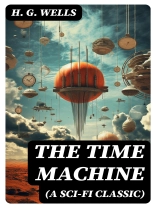H. G. Wells’ 'The Time Machine’ is a seminal work in speculative fiction that intricately weaves themes of time travel, social commentary, and human evolution. Written in 1895, the novella employs a frame narrative to explore the implications of time travel through the eyes of an unnamed Time Traveller, whose journeys reveal a distant future inhabited by the Eloi and the Morlocks. Wells’ literary style merges vivid descriptions with philosophical discourse, reflecting the anxieties and aspirations of the late Victorian era, particularly regarding class division and industrialization’s impact on humanity. H. G. Wells, often hailed as the father of science fiction, was profoundly influenced by the scientific advancements and societal transformations of his time. Educated in science and history, Wells possessed a keen understanding of the interplay between technology and society. His experiences and observations instigated a desire to explore speculative futures, making 'The Time Machine’ not only an engaging story but also a profound critique of contemporary civilization and a cautionary tale about the consequences of unchecked progress. This classic is a must-read for both enthusiasts of science fiction and those interested in sociocultural insights. Wells’ prescient ideas and imaginative narrative not only entertain but challenge readers to ponder the ethical dimensions of scientific discovery and the trajectory of humanity itself.
O autorze
Herbert George Wells, commonly known as H. G. Wells (1866–1946), was a prolific English writer in many genres, including the novel, history, politics, and social commentary, and textbooks and rules for war games. Wells is now best remembered for his science fiction novels and is often referred to as a father of science fiction, alongside Jules Verne and Hugo Gernsback. His most notable science fiction works include 'The Time Machine’ (1895), 'The Island of Doctor Moreau’ (1896), 'The Invisible Man’ (1897), and 'The War of the Worlds’ (1898). 'The Time Machine’, a seminal work in the science fiction genre, introduced the intriguing concept of time travel by means of a device and explored the themes of social inequality and the implications of evolutionary theory. Wells’s literary style is marked by a clear, direct narrative approach coupled with an imaginative vision. His foresight in predicting the future with stories of space travel, atomic energy, and other technological advancements is one of his most enduring legacies. Through his work, Wells not only entertained but also provoked thought on social reform and the potential of human progress – or regression. His influence extends far beyond his own time, shaping both the genre of science fiction and the broader cultural imagination.












